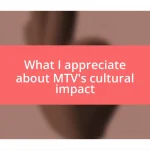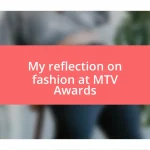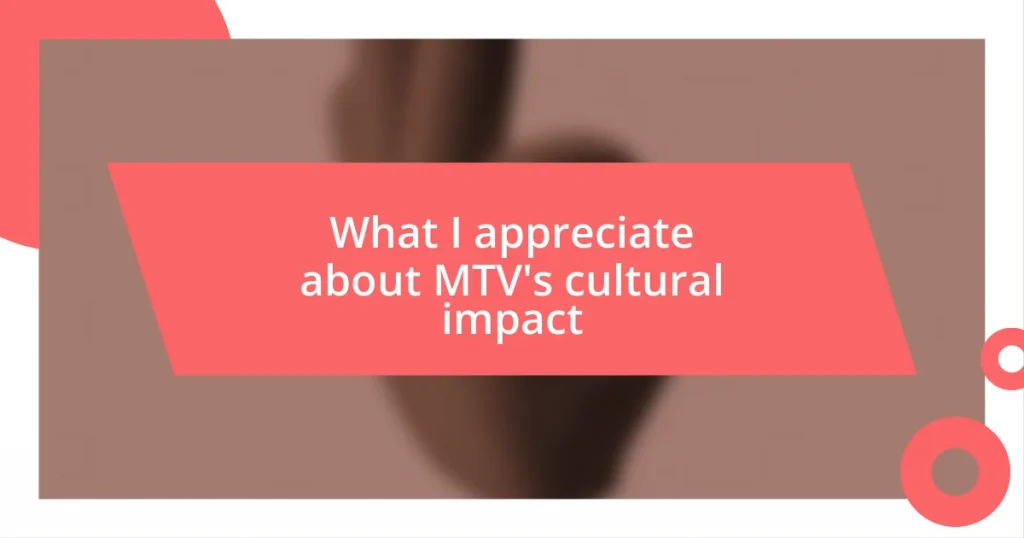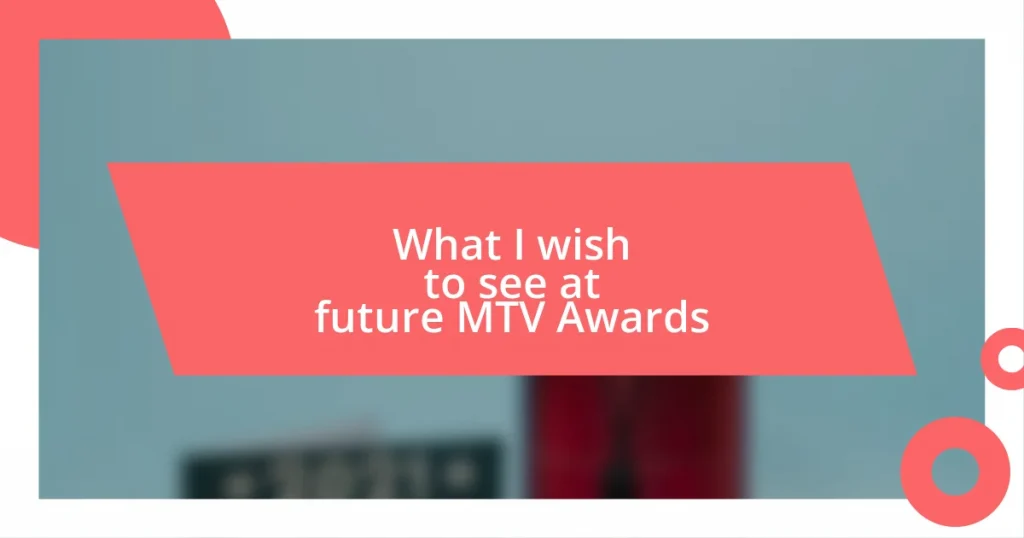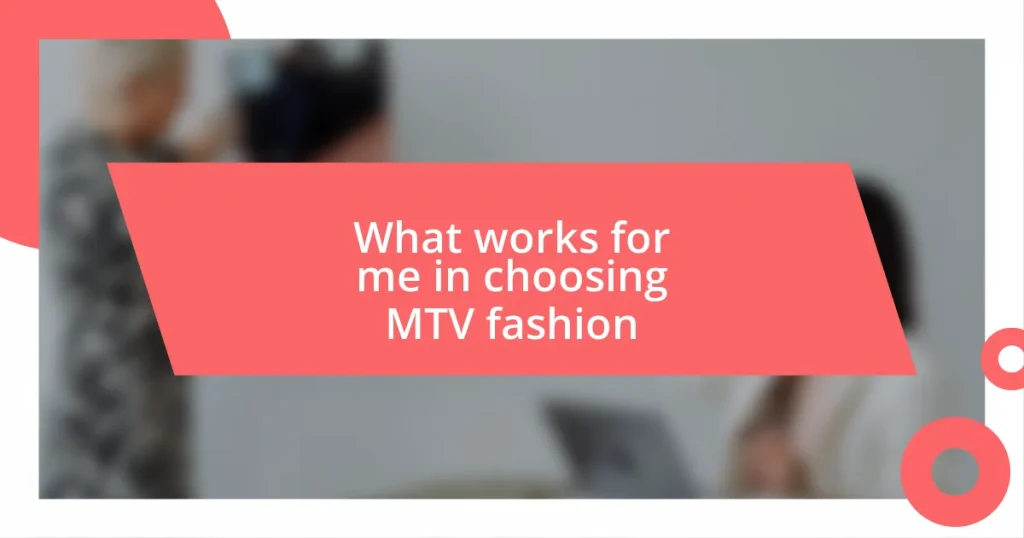Key takeaways:
- MTV transformed music consumption by integrating visuals, creating iconic music videos, and fostering a sense of community through shows like “Total Request Live.”
- The network significantly influenced youth identity by promoting diverse representation, encouraging individuality through fashion, and fostering connections around relatable content.
- MTV’s legacy includes not only shaping modern media and reality television but also advocating for social issues, advancing conversations on difficult topics, and empowering future generations through representation and inclusivity.

MTV’s role in music culture
MTV revolutionized the way we experience music by placing visuals at the forefront of the listening experience. I still remember the first time I saw Michael Jackson’s “Thriller” video; it felt like stepping into a cinematic world where music came alive. Can you recall the thrill of seeing your favorite artist perform in a vivid, imaginative clip? That’s the power MTV unleashed.
The network didn’t just play music; it created a vibrant culture around it, giving birth to iconic moments and trends. I vividly recall the excitement of watching “Total Request Live,” where fans would call in to vote for their favorite music videos. It was not just about the music anymore; it was about community and connection. How did those shared viewing experiences shape your own appreciation for artists?
MTV’s bold choice to feature diverse genres broadened our musical horizons. Artists like Madonna pushed the boundaries of creativity, combining fashion and music in ways that felt revolutionary at the time. Reflecting on that, I realized how important it was for me—and many others—to see music not just as sound, but as a full expression of identity and art. How do you think this inclusivity influenced the music we listen to today?
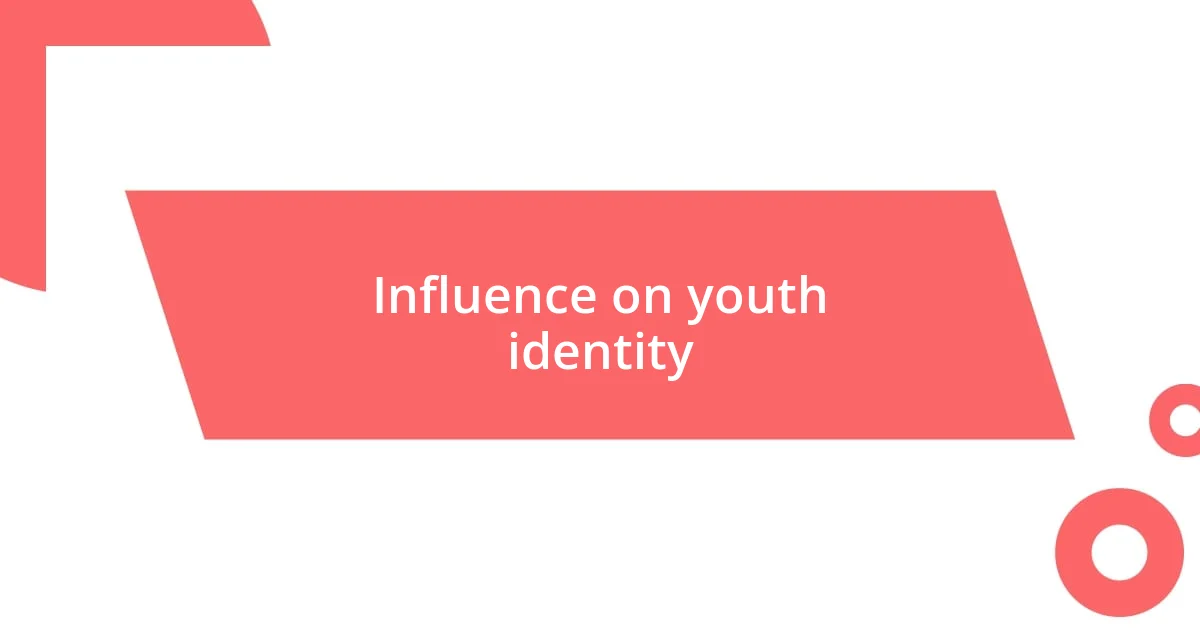
Influence on youth identity
MTV’s influence on youth identity is undeniable. I remember how seeing diverse artists represented on the channel allowed me to embrace my own uniqueness. It was like a mirror reflecting a spectrum of identities, and it empowered many young people to explore who they were beyond societal expectations. Did you ever feel that sense of freedom when you saw someone on TV who looked or acted like you?
As trends evolved, MTV became a platform where individuality thrived. From the punk-rock style of Joan Jett to the pop icons like Britney Spears, I realized that these artists offered more than just entertainment; they provided a framework for self-expression. Their music and style inspired us to carve out our own identities amidst peer pressures. Think about a time when a particular artist inspired you—isn’t it fascinating how music can shape who we aspire to be?
The unique content curated by MTV fostered a sense of belonging among youth. Community formed around favorite shows like “The Real World,” sparking discussions about life, love, and everything in between. Looking back, I can see how those moments of connection helped me—along with countless others—build our own narratives and embrace collective identities. Wasn’t it exhilarating to feel part of something larger, as we all related to those heartfelt stories?
| Influence on Youth Identity | Key Elements |
|---|---|
| Diversification of Representation | Artists showcasing a variety of cultural backgrounds and experiences |
| Trendsetting Fashion and Music | Encouragement to express individuality through style and genre |
| Cultivating Community | Shared experiences leading to connections over relatable content |
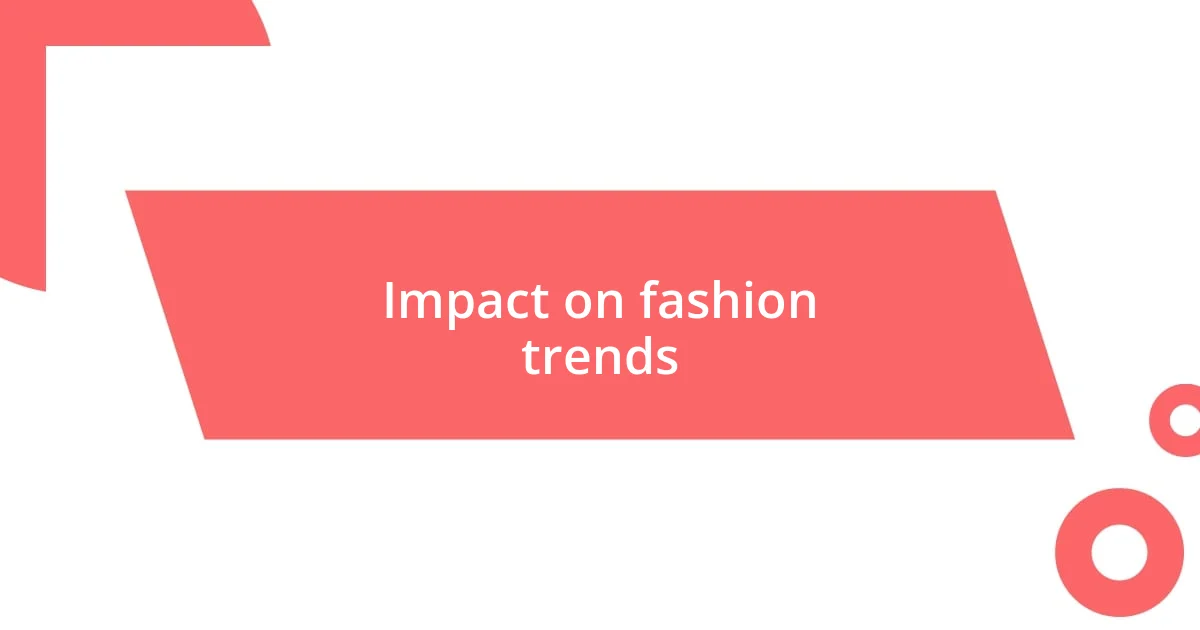
Impact on fashion trends
MTV’s influence on fashion trends is nothing short of transformational. I remember flipping through the channels back in the day, and suddenly, the music video for “Vogue” would come on. The visuals were striking—models striking poses in stunning outfits that blended high fashion and pop culture. That moment ignited an appreciation for creative expression through clothing, and I found myself wanting to emulate those bold styles. Have you ever felt inspired to try something new just because you saw an artist rock it?
MTV didn’t just showcase music; it showcased life and fashion in vibrant, expressive ways. The network introduced iconic styles that became culture-defining. Artists like Janet Jackson popularized elaborate streetwear, while grunge attire was propelled by Nirvana’s influence. Here are a few notable fashion impacts MTV has had over the years:
- Music Video Aesthetics: The dramatic and creative visuals pushed viewers to explore daring styles beyond conventional norms.
- Celebrity Trends: Red carpet moments and performances turned artists into fashion icons, encouraging fans to adopt their signature looks.
- Youth Culture: MTV’s portrayal of varied subcultures fostered acceptance of different fashion statements, allowing individuality to flourish.
Reflecting on these trends reinforces the reality that fashion shapes identity just as much as music does. I often think about how clothing choices can convey a message about who we are and what we stand for. It’s fascinating to see how MTV played a pivotal role in how we express ourselves through fashion, don’t you agree?
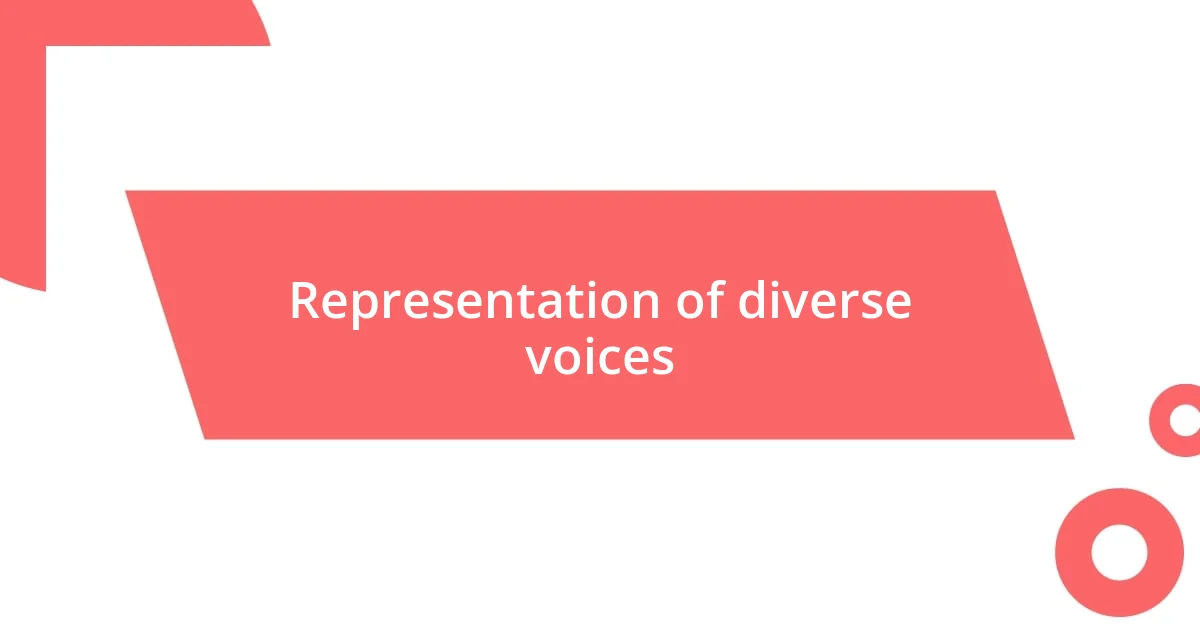
Representation of diverse voices
MTV has been a groundbreaking platform for the representation of diverse voices. I recall watching “Making the Band” and being captivated by the different backgrounds of the artists involved. Each story brought a new perspective that resonated with me, highlighting not just their talent but their unique experiences. Hasn’t it always struck you how powerful it is to see someone’s journey unfold on screen, revealing the richness that diversity brings?
The way MTV showcased these diverse narratives opened the door for discussions about race, gender, and sexuality, often before those conversations gained traction in mainstream media. I remember the excitement of watching shows like “The Real World,” where people from different walks of life lived together, confronting their differences. It made me realize that the struggle for understanding and acceptance is universal. Can you think of a moment from those shows that challenged your beliefs or made you more empathetic?
MTV also ventured into genres and musical styles that often went overlooked. Artists like Janelle Monáe and Lil Nas X not only broke barriers with their music but also challenged stereotypes within the industry. Watching them thrive made me feel hopeful about the future of representation, reminding us that our stories matter. How incredible is it to witness artists bravely owning their narratives and inspiring us to do the same? Through their voices, I felt encouraged to embrace my own story—flaws and all.
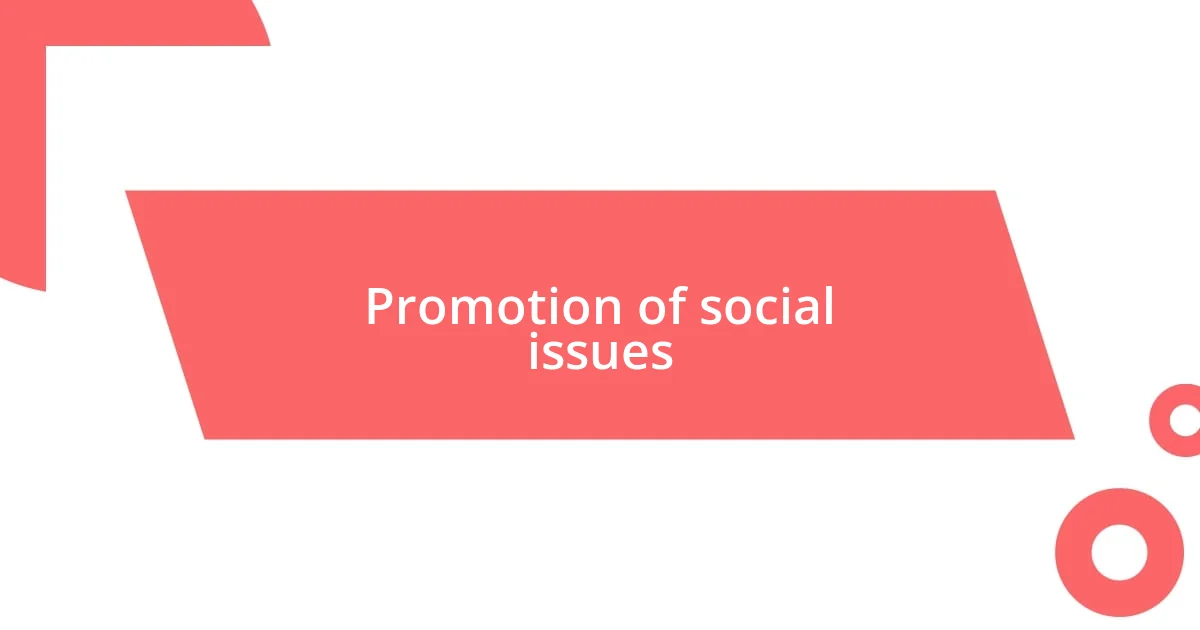
Promotion of social issues
The promotion of social issues has long been a significant aspect of MTV’s cultural impact. I vividly recall the powerful message behind the “I Want My MTV” campaign, which went beyond music and challenged viewers to consider what it meant to be part of a broader community. The inclusion of socially charged themes in music videos sparked my awareness of vital issues, encouraging me to engage with topics like mental health and environmental activism. Have you ever found yourself moved by a song that addressed a social concern?
Many artists used their platform on MTV to raise awareness. Take, for example, the poignant influence of artists like Madonna and her dedication to HIV/AIDS education in the ‘80s. When I saw her emotional performances that highlighted the struggles of those affected, it left a lasting impression on me. It was a wake-up call that reminded me of the power of music and media in shaping societal perceptions. How often do we underestimate the ability of a song to ignite change in our hearts and minds?
MTV has also tackled contemporary issues through innovative programming. I remember the impactful series “True Life,” which featured real stories of people dealing with addiction, bullying, and poverty. Those narratives brought a sense of empathy and understanding that sometimes feels missing in our everyday interactions. Reflecting on that, I realize these stories not only educated viewers but brought us all a little closer together. Isn’t it amazing how a program can create a sense of community and spark important conversations?
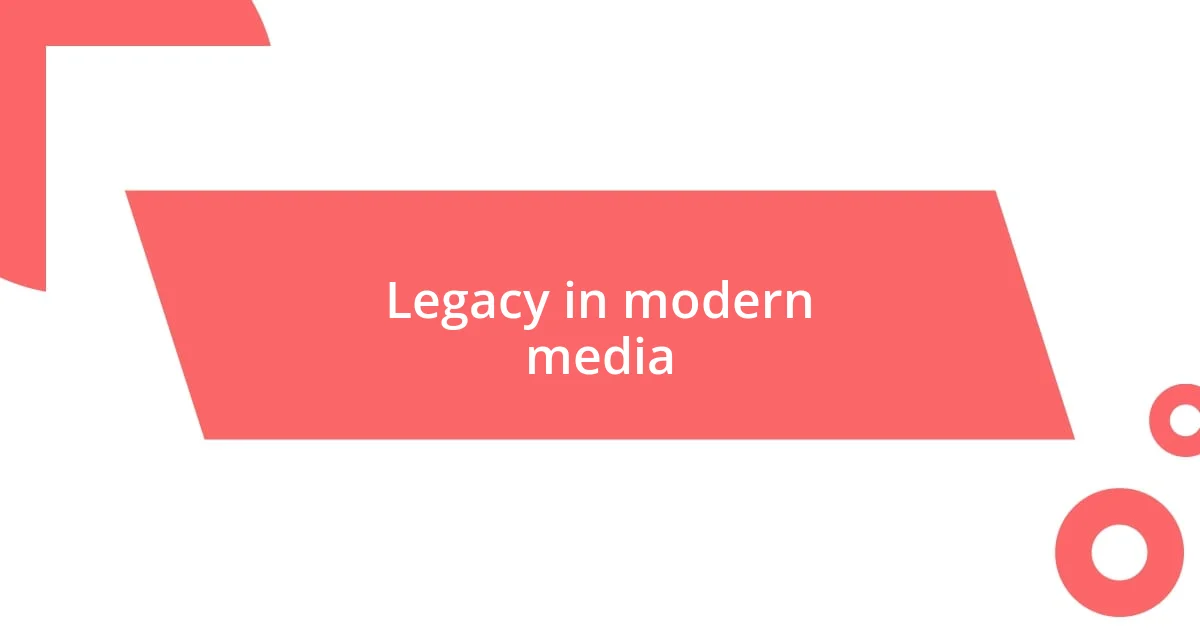
Legacy in modern media
MTV’s legacy in modern media can be seen in how it shaped the way we engage with content. For instance, the introduction of the “Unplugged” series was a game-changer for me. It presented music in such an intimate way, allowing artists to connect with audiences on a personal level. I still remember being mesmerized by an acoustic performance from Nirvana that changed how I perceived music; it was raw, honest, and incredibly impactful. Have you ever had a moment where a performance felt so genuine that it resonated deeply within you?
Another fascinating aspect of MTV’s influence is how it paved the way for reality television. Shows like “The Osbournes” and “Laguna Beach” transformed the landscape of entertainment. They blurred the lines between scripted and unscripted content, making us feel like we were part of someone else’s life journey. I’ll never forget being glued to my screen, captivated by the drama and authenticity that unfolded. It left me wondering: how much of what we see reflects reality, and how much is curated for entertainment? This shift in storytelling has definitely influenced how we approach media consumption today.
The network also laid the groundwork for digital platforms by embracing new technologies. I recall the excitement around MTV’s early ventures online, from music video streaming to interactive shows. This forward-thinking mindset not only connected fans with their favorite artists but also set the stage for today’s social media landscape. Hasn’t it been fascinating to see how artists now engage with audiences through platforms like TikTok and Instagram? MTV’s pioneering spirit created a ripple effect across the industry, influencing how we consume and interact with media today.
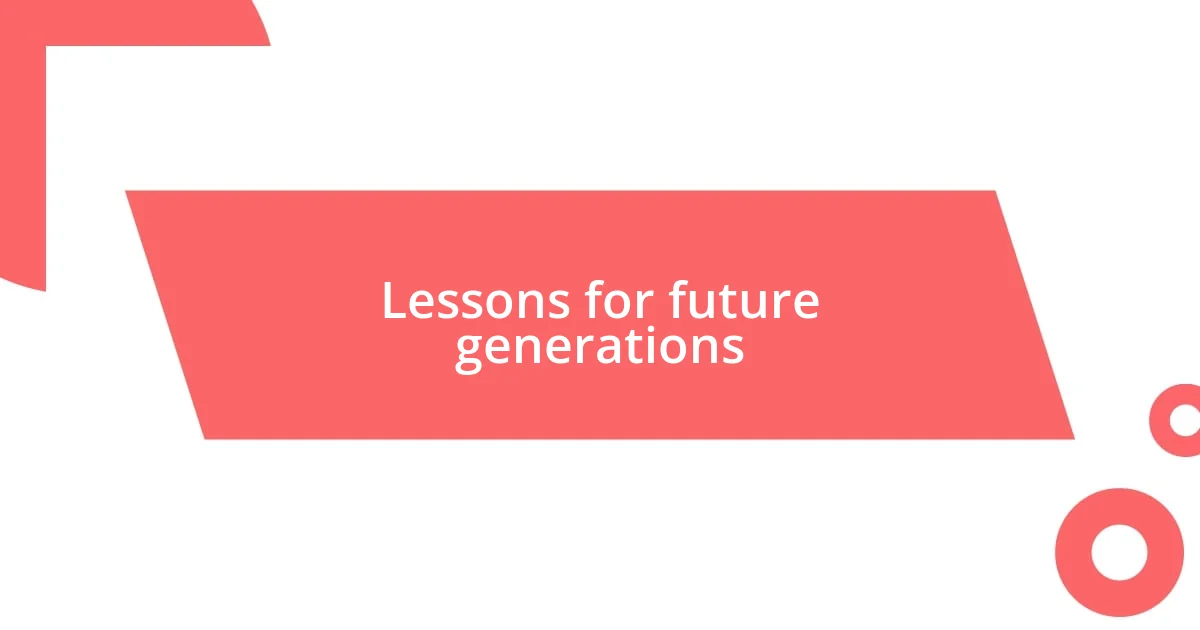
Lessons for future generations
MTV has taught us that the power of representation can shape societal narratives. I remember a particular moment watching an artist like Jay-Z share his journey and struggles. It wasn’t just music; it was a message of resilience that resonated with many, including myself. How often do we consider the weight of our stories? Future generations should embrace their voices, knowing that sharing their truth can inspire others.
Another lesson I cherish is the importance of inclusivity. MTV was groundbreaking in showcasing diverse cultures and lifestyles through its programming. I still recall the first time I saw an artist from a different background, breaking stereotypes and barriers right on my screen. It prompted me to reflect on the variety of perspectives that enrich our world. Isn’t it fascinating how exposure to diverse narratives can change our understanding of one another?
Finally, the ability to spark conversations around difficult topics is monumental. MTV wasn’t afraid to tackle taboo issues, inspiring many to discuss matters that would typically remain unspoken. I distinctly remember a discussion about body positivity initiated by an MTV special that encouraged self-love and acceptance. It made me realize how lacking such dialogues can hinder personal growth. The takeaway is clear: future generations should feel empowered to engage in these essential conversations, fostering a society that’s more compassionate and understanding.



